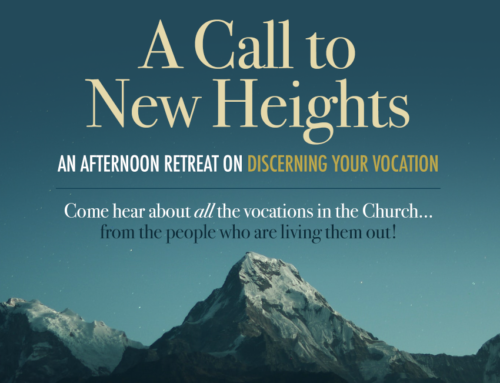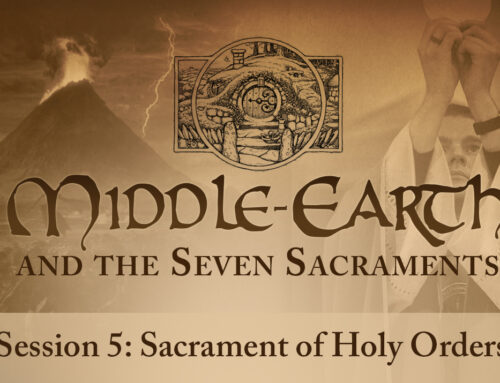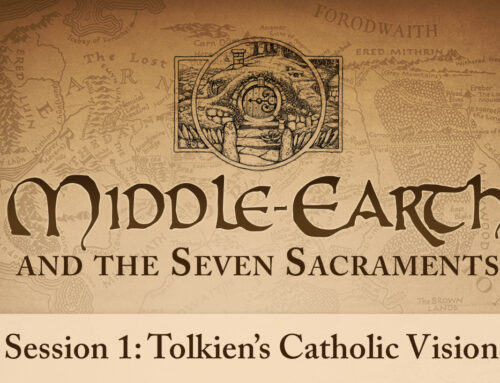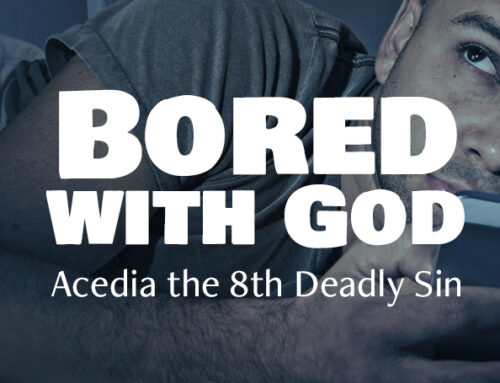This talk was originally delivered at a Theology on Tap.
Tonight’s talk will dig into some philosophical language, but I’m going to try my best to keep it practical. The talk is, after all titled “Unbiased Reality,” so hopefully I’ll stick to that — reality. I’m not here to spout off about pie in the sky ideas or theories. Just the opposite in fact — A genuine philosophy is one that helps us become more human… one that corresponds to our real-life, everyday experiences. It is, in the final analysis, completely real and rational. Thomas Aquinas defines Truth as “the agreement or conformity of reality and the mind’s judgment on reality.” Tonight, we are concerned with precisely this: The Truth… the whole Truth… and nothing but the Truth. With this firmly in mind, let us begin.
There was an Italian priest named Fr. Luigi Giussani who made it his life’s project to engage the human thirst for the whole Truth, as revealed in the Person of Jesus Christ — the Word made flesh. The movement he founded is called Communion and Liberation. Its goal is pretty simple: to form mature Christians… “mature” meaning, ones who love the Truth more than their own ideas about Truth…
But this is easier said than done. As Fr. Giussani points out, any serious inquiry into the Truth needs a healthy dose of what he called “realism.”
Realism, for Giussani, means to experience reality in total humility, free from any projections on preconceived notions from ideological systems or prejudices. In other words, Giusanni is appealing for an “unbiased reality.”
To be totally humble and unbiased toward reality is a posture that allows for real conversation and dialogue to happen. Msgr Albacete, another member of the Communion and Liberation movement says this: “Anybody… ANYBODY who is committed to rationality (or reason), I can enjoy many cappuccinos with them.”
When Msgr Albacete says he can enjoy a cappuccino with anyone (even an atheist!) passionately committed to rationality — someone who is sincerely OPEN to reality, he is hitting at a profound truth: It’s easy to have a conversation with someone who is honestly asking the right kind of questions — even if they happen to believe something different from you…. That’s because they at least have a sincere desire for Truth, and thus, they are relatable. Jesus promises us point blank: “Ask and you shall receive, Seek and you will find. Knock and the door will be opened unto you.”
This conviction of both Fr. Giussani and Msgr Albacete has to do with the deeply traditional Catholic belief that the human person naturally thirsts for the Whole Truth. We want to encounter the Transcendent — the Absolute Truth — We find ourselves incomplete, bored, and sad when deprived of that full Truth.
As Bishop Barron put it so well: “The mind is a search engine. It is always questing. It’s restless. The mind is not passive. It actively seeks what it wants. And what does it want? The Truth. But how much truth? Not just this or that [truth]… The more answers you get, the more questions you have. What’s [the mind] finally after?” Bishop Barron asks. “What the mind wants” he says, “is the unconditioned Truth. It wants to know everything about everything. It wants Truth itself. The shorthand term for that… is God.”
To reiterate, Fr. Giussani believed that the human mind… and heart… is frustrated and unsatisfied with anything less than the whole Truth itself.
And this brings me to a really important point: At the end of the day, whether we realize it or not, each one of us is a philosopher and theologian. Deep down, every honest human being is seeking a satisfying and full answer to the ultimate question: “What is Truth…or better yet… who is Truth?”
We express our personal theology in how we approach the world around us — how we treat one another, how we behave, the lens through which we see reality. And this theology can be good (if it happens to align with reality) or it can be defective (if it fails to align with reality).
There’s great a book by a theologian named Frank Sheed called “Theology and Sanity.” One of his central themes throughout the book is expressed in the title itself: Good theology is nothing more than sanity.
To be a good theologian is to be a person who receives reality in the proper way, in the sane way… as it actually is. We often think of theology as a system of ideas or a body of beliefs that we need to try very hard to adhere to… as if they are arbitrary tenants and doctrines that we Catholics just happen to believe in.
But at the heart of our faith is the radical claim that the only good reason to be Catholic is that it is True with a capital “T.” That our faith is True outside and above our own understanding of it.
Christianity is not something that defies reason. It’s not something anybody concocted or artificially produced. It is downright sane to be Christian.
Yes, the shocking claim of Frank Sheed, Fr. Giussani, and not to mention the whole Catholic Tradition is simple: To be Catholic is to be fully rational. To be Catholic is to be a fully reasonable human being — someone who takes into account the whole of reality and leaves nothing out. Someone who is completely and utterly open to the truth in all of its aspects, free of any passing ideological prejudice or fad.
Good philosophy is corresponds to the way things really are — Truth that is outside ourselves. Truth that is true whether or not we like it. Truth that is eternal. Truth that just is. The words Moses heard from the burning bush might come to mind here: “I am who I am.” God is who He is, regardless of our systems of thought about Him. Regardless of our prejudices. Regardless of our personal bias. The honest job of the human person, therefore, is to align oneself to this Eternal Truth — to grow closer to the One who is Truth itself, the Great I-AM who is Our Lord and God.
Without this relationship — without this religious affirmation of what really is — we are bound to create for ourselves false systems, false philosophies, false theologies. Without approaching the Truth with humble openness and a radical willingness to align ourselves to it no matter the cost, we will inevitably distort reality. We will create God in our own image, and end up worshipping ourselves… We will end up creating a “biased reality.”
Unfortunately, I think this is where we find our culture today. We live in an age that prefers ideologies over the pursuit of Unbiased Reality. Fr Giussani defines ideology as “a construction developed from a pre-conception, based on an aspect of reality — even a true aspect — which is formulated for the aims of a philosophy or political project and made into an absolute.”
CS Lewis warned against this kind of misguided absolutization in Mere Christianity when he writes this: “The most dangerous thing you can do is to take any one impulse of your own nature and set it up as the thing you ought to follow at all costs. There’s not one of them which won’t make us into devils if we set it up as an absolute guide.”
An ideology, therefore, is a reduction of reality — a half-truth. Any ideology inevitably leaves something out, and to that extent is unreasonable or even… “insane.” No ideology can contain the whole of reality. Remember, human beings desire Truth Himself… not a system of ideas about the truth.
Granted, some ideologies include a lot of good things… and some certainly leave out more than others… But no “ideology” is sufficient in itself. It’s always a reduction of the whole… a construct that declares one limited aspect to be the whole.
One of the most common ideologies of our day has to be materialistic scientism. This is the ideology that tells us that the only real knowledge is that which can be empirically verified and demonstrated by science and mathematics. Anything outside of this realm is reduced, therefore, to sentiment, opinion… subjective experience that cannot be expressed in an objective truth claim.
But see what damage this does to the fullness of reality! It’s limited! Materialism reduces reality to that which can be experimented on under a microscope. What we’re left with is a severely restricted understanding of what we can know to be “True.” A consistent materialistic lens necessarily reduces love, friendship, and forgiveness to something in the end… non-sensical and unintelligible. We then need to resort to a soft relativism about what matters most to us as humans!
GK Chesterton put it bluntly when he says: “The materialist philosophy is certainly much more limiting than any religion. The Christian is quite free to believe that there is a considerable amount of settled order and inevitable development in the universe. But the materialist is not allowed to admit into his spotless machine the slightest speck of spiritualism or miracle… The materialist’s world is quite simple and solid, just as the madman is quite sure he is sane.”
Within this limited and constrained system, aspects of reality that are considered ‘unscientific’ or ‘lacking concrete evidence’ do not just go away. We cannot ignore them, because they are part of who we are as human beings. In fact, as I said before, they’re the most interesting aspects of reality!
Fr Giusanni uses the following example to illustrate this point. Mankind, by its scientific advancements, can accurately measure the orbit of the earth around the sun. This is a demonstrable, unassailable fact about the way things are. However, which would you rather know? The measurement of earth’s orbit… or the fact that your mom loves you?
The choice should be clear… Knowing that your mom loves you is an infinitely more meaningful thing to know than the earth’s orbit. Even so… you cannot demonstrate by cold logic that your mother loves you. You can’t see love under a microscope! Yet it remains entirely reasonable to believe your mom loves you… despite the lack of empirical proof. You’d be insane not to. Love must be taken on good faith…not blind faith. It’s about trust. Love is part of the human experience of reality, and so our philosophy must account for it.
The most important, meaningful, and compelling aspects of reality are not compatible with materialistic scientism. Therefore, it is too small. On the topic of materialism, GK Chesterton says: “As an explanation of the world, materialism has a sort of insane simplicity. It has just the quality of the madman’s argument — we have at once the sense of it covering everything and the sense of it leaving everything out.” He goes on to say that he materialist’s “cosmos may be complete, but still his cosmos is smaller than our world.” In other words, it’s biased, and therefore an insufficient answer to the ultimate questions of life.
I’m afraid that our Western secularized society has largely ceased to approach reality with simple openness, and instead we look at the world with clouded eyes… eyes that are filmed over with a thousand distorted lenses that have been imposed on us by the powers that be. The furious and aggressive ideologies of post-modern culture ultimately undermine our ability to receive reality as it is. Gender ideology, materialism, hedonism, scientism — take your pick… they all prop up one aspect of reality as the absolute. They hold us back from receiving Truth because they are burdened with a thousand different incompatible and insane presuppositions. To align ourselves to the countless ideologies that mark our age is to submit to INSANITY in the proper sense.
The effects of such a restricted view of reality are palpable. When Truth is so limited, our innate desire for Absolute Truth is stifled, but not overcome.
For lack of a better word, we become cramped by all the bias. The human person is made in the image of God… and that image cannot be locked within the cage of ideologies without serious repercussions. I tend to think this is why so many people are sad, bored, and anxious today.
We instinctively know that reality is being confined and restricted by the prevailing opinions of our age — and so we shut down and numb our expectations. Msgr. Albacete warns against a “reduction of desire.” We lower our expectations, and thus invite spiritual boredom into our heart. When the world constantly shouts at us there is no transcendence, that we are strictly biological beings and that the only meaning in life is whatever we happen to assign it… well that’s a recipe for despair. The human being has a natural desire for transcendence. When we ignore the thirst for true religion, we suppress that desire, and we become less human.
So what’s the antidote to all this? How do we combat this “biased reality” that kills off love and prevents joy?
In a word: The Incarnation. The moment the Word became Flesh in the Virgin Mary’s womb was the moment God proved to us, once and for all, that He wasn’t just an abstract, distant idea for us to think about all day. God isn’t a convenient ideology for us to cling to and hide behind — Jesus is a Savior who is willing to step down into our broken condition and lift us back up again.
It’s in the Incarnation that the Second Person of the Trinity — Eternal and Timeless — steps into time and shows Himself as the fullness of revelation.
Today, we still experience the Incarnation. This happens in a couple ways:
First: Through the ministry of the Church, especially Her Sacraments — This is the Incarnation extended through space and time. Christ is the one who baptizes, who forgives, who offers the Eucharist. When we encounter the Church, we encounter the Body of Christ. When Paul was “knocked off his horse,” Jesus asked: “Saul, Saul, why are you persecuting me?” Jesus identifies himself with the Church. When we cut ourselves off from the Church, the Body of Christ, Jesus might just as well ask: “Why are you limiting your understanding of reality? Why are you cutting yourself off from the fullness of life?”
Second: We experience Christ’s tangible presence in His saints — These are the people who have so aligned themselves with “unbiased reality” that they have become perfectly united with the One who is the Great I-AM — the Absolute Truth we thirst for. Their life IS the life of God.
They no longer see things “dimly as in a mirror” but rather “face-to-face” — they see the reality of God, face-to-face! When you meet a living saint, someone who is really truly pursuing the Truth — you are forced to ask yourself: “Am I pursuing truth like that person?”
This kind of availability to the Truth cracks open our heart and invites grace in. When someone pursues God — or rather, allows God to pursue them unconditionally, it causes people to ask questions, to wonder — Maybe there’s more to life than I realize. Saints don’t settle for small-minded ideologies and intellectual prejudices. Saints want the fullness of Truth, the fullness of reality.
As I rather abruptly wrap up this talk, it is my sincere prayer that we never settle for the bias our world wants to shove down our throats. Let’s never settle for the censorship of reality. We demand the whole Truth. We are worth too much to the God who loves us for us to settle for such a constrained perspective of reality. God means to give us everything if we allow Him to. He desires to give us nothing less than Himself.





Leave A Comment